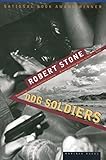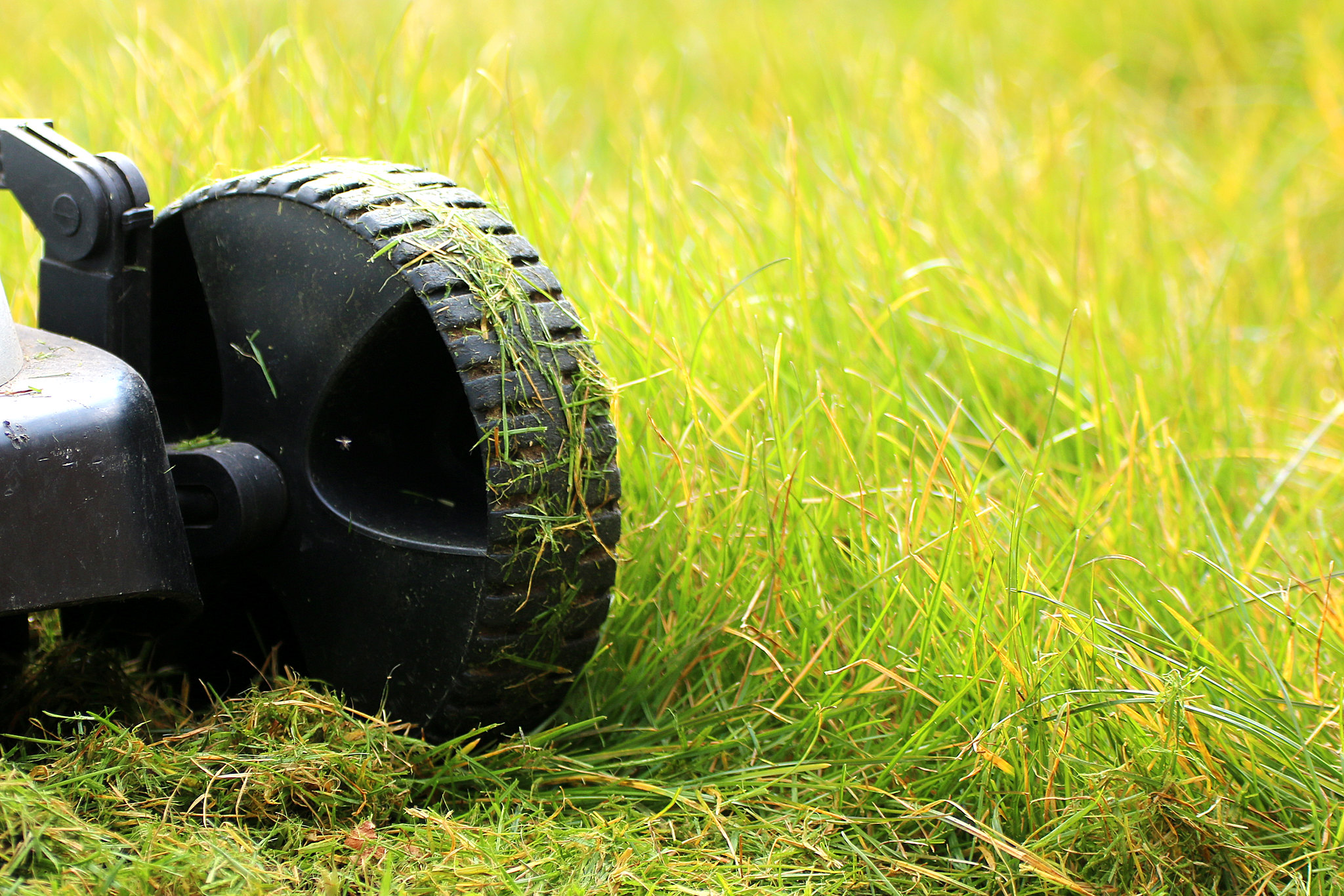After decades of pushing, my father wanted to ride. He bought a Snapper mower, and I remember running after him while he drove. I liked how the grass would lighten or darken depending on his direction. His stripes and patterns were forms of revision, our home made new.
My father cared about our lawn, but never became obsessed with it. Like his father, he was a carpenter, so he thought in geometric precision. He always had a pencil sharpened like a blade that he would use to tick-off inches or locations to saw. He would lay awake in bed planning the leveling of a cabinet top or the raising of a floor. Despite that attention and forethought, my father’s pride in his lawn never made him prideful. One’s lawn is like a face for the world. Siding and roofs need to be replaced in time, but an unkempt lawn soon spills into the driveway, over curbs, onto the road. For my father, a former All-American running back who was calm and soft-spoken, caring for a lawn was like an exercise in restraint. A way to control one’s own space.
In his essay “How Green Was My Suburb,” Ted Steinberg traces the lineage of lawns from George Washington and Thomas Jefferson to the post-World War II domestic renaissance of Abraham Levitt, who thought trim lawns were a form of “neighborhood stabilization.” Lawn maintenance was neighborhood maintenance. Levitt is best known for the 1947 construction of Levittown, Long Island, which Steinberg sums up as the “mass production of low-cost housing, producing the cookie-cutter houses embraced by some as the epitome of the American dream and reviled by others as the start of soulless suburban conformity.” Along the lines of that contrast, Levitt’s call for lawn care was tempered by the worry that the American quest for lawn perfection would lead to obsession and disillusionment (Jonathan Franzen once quipped that mowing is “among the most despair-inducing of human activities;” pair that sentiment with the most John Updike of John Updike descriptions, “[while] he pushed a balky lawn mower through the wiry grass around their rented house, Richard thought about nakedness”). Levitt cautions: “Even our lowly weeds, which are just other native grasses, if kept cut to not more than two inches help to green carpet the ground.”
Lawns — big or small, green or brown — are places of play. I think of Gerard Manley Hopkins’s poem “The Habit of Perfection,” with the lines “O feet / That want the yield of plushy sward.” Few things return us to youth as much as walking barefoot on grass. Hopkins’s love for the natural world extended to the prose of his notebooks: “Green-white tufts of long bleached grass like heads of hair or the crowns of heads of hair, each a whorl of slender curves, one tuft taking up another — however these I might have noticed any day, I saw the inscape through freshly, as if my eye were still growing.”
The weekly ritual of mowing, of men and women walking their property like mechanical monks, is fodder for literature. Robert Wrigley‘s gorgeous “Mowing” is one of my favorites. How true are these opening lines: “Sleepy and suburban at dusk, / I learn again the yard’s / geometry…Shoving such a machine / around a fairway of dandelions, / it is easy to feel absurd.” During one cut, his mower’s blade “pulls” yellowjackets “from their deep sweet chamber,” and he is stung. The man torches the nest, and the “blackened” lawn scar remains until it is covered by snow, only to be revealed again come spring. Mowing is a cycle of returns.

 For years I offered to mow my father’s lawn, but was careful to not steal that ritual from him. He would have given it to me, but part of growing up is knowing what is yours, and what is not. I worked for town and county grounds departments during the summers, mowing roadside slopes and rocky park entrances. I later worked for The Seeing Eye, where I graduated from push mowers to a wide Steiner tractor, the type used on baseball fields. I would bring a Gatorade and a book — everything from The Imitation of Christ by Thomas à Kempis to Dog Soldiers by Robert Stone — to a wide expanse at the edge of the campus. Bordered on one side by a treeline, and the other side by a post-and-rail fence, I mowed for much of the afternoon, taking breaks in the shade to read.
For years I offered to mow my father’s lawn, but was careful to not steal that ritual from him. He would have given it to me, but part of growing up is knowing what is yours, and what is not. I worked for town and county grounds departments during the summers, mowing roadside slopes and rocky park entrances. I later worked for The Seeing Eye, where I graduated from push mowers to a wide Steiner tractor, the type used on baseball fields. I would bring a Gatorade and a book — everything from The Imitation of Christ by Thomas à Kempis to Dog Soldiers by Robert Stone — to a wide expanse at the edge of the campus. Bordered on one side by a treeline, and the other side by a post-and-rail fence, I mowed for much of the afternoon, taking breaks in the shade to read.
The Steiner worked well, but had to be trucked to Pennsylvania whenever it needed service. After I got married, I wore my father’s Snapper into the ground, but my wife surprised me with a John Deere. We moved to a new house with several acres, but I committed the mortal small engine sin — not checking the oil — and the tractor choked to a stop on a hill. A month later, grey clouds swarming above and Hurricane Sandy hours from landfall, I sold the tractor to a man named Norbert. He pushed the mower into a white van, and drove into the coming storm.
In “The Lawn Mower” by Sarah Barber, night is the time to flip over a busted mower: “In this our suburban Eden we’ve only / a teenage Adam too dreamy to manage / his motorized scythe and silly Eve leaving / her coffee cups and plastic paint pots / behind in the grass.” The narrator “like[s] my mower / turned over among the glowworms, / a monstrous dandelion as unnatural as we / are, out in a garden, with our untidy / golds and our dangerous sharps.” “The Mower” of Philip Larkin’s poem is in a worse state. Twice-stalled, the second reason is a “hedgehog jammed up against the blades.” The narrator has seen the animal before, “even fed it, once.” He feels guilty, ending “we should be careful / Of each other, we should be kind / While there is still time.”
Pastoral writing is no stranger to melancholy, but a particular strand appears within the literature of lawns. Take “An Old Push Lawnmower” by Coleman Barks, the narrator of which is “nostalgic for a life I’ve never led, a grounding / in tools and physical work that I have never earned.” He keeps an old yet oiled push lawnmower in his living room “so as to delight in the sound of pushing it around indoors.” In Anne Sexton’s “The Double Image,” inspired by a time when Sexton’s daughter lived with the poet’s mother-in-law, the narrator reflects on absence: “All that summer sprinklers arched / over the seaside grass…To help time pass / I tried to mow the lawn / and in the morning I had my portrait done, / holding my smile in place, till it grew formal.”
The John Deere sold, my shed was empty until the next spring, when I bought a zero-turn mower. I had more ground to cover at our new house, and less time; with twin girls inside, there was no time to mow circles and loops in the field. Yet I still enjoy my rides; mowing makes me feel young. I appreciate the sentiment of Jill Alexander Essbaum in “Mow Job”: “I do the summer work of a twelve-year-old boy, which isn’t surprising as I have the sense of humor of a twelve-year-old boy: I cut grass.” She started mowing for “fast cash,” and liked the “labors of clearing out, cleaning up, and cutting down.” Her mower is “red,” and bought by her ex-husband, but “I assumed custody when we split.” She is “no landscaper, no gardener.” Rather, “an Army barber, your one-woman clean-up crew.”
Some days I can move the mower slowly, along lazy paths. On my return from each lap, I see my daughters leaning against a window, laughing at daddy spinning around on a ridiculous machine. On other days, when rain beckons and the grass looks nearly knee-high, I need to scorch green earth. More often, I simply head out to the lawn with the same source of pride that I bring to words. I want the lawn to look nice because it is ours. We have worked years for it.
Pride is difficult to parse in the present moment. Pride is not the same as vanity. Pride is what makes a young writer believe that her words are worth reading, despite a world, a culture, that might prefer her silence. Pride is the most important trait that I can help shape in my students; pride means worth. In our collective fear of being too proud, I wonder if we have enabled some to not care as their default emotion. We could do worse than to create things that we are proud of, whether they are loving relationships, careful words, or mowed lawns.
Image Credit: Flickr/kmdoncaster.










